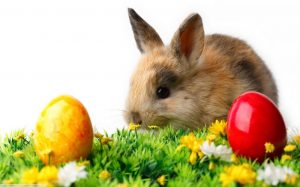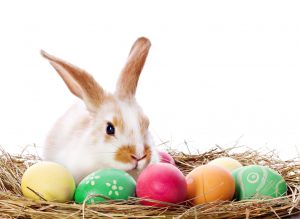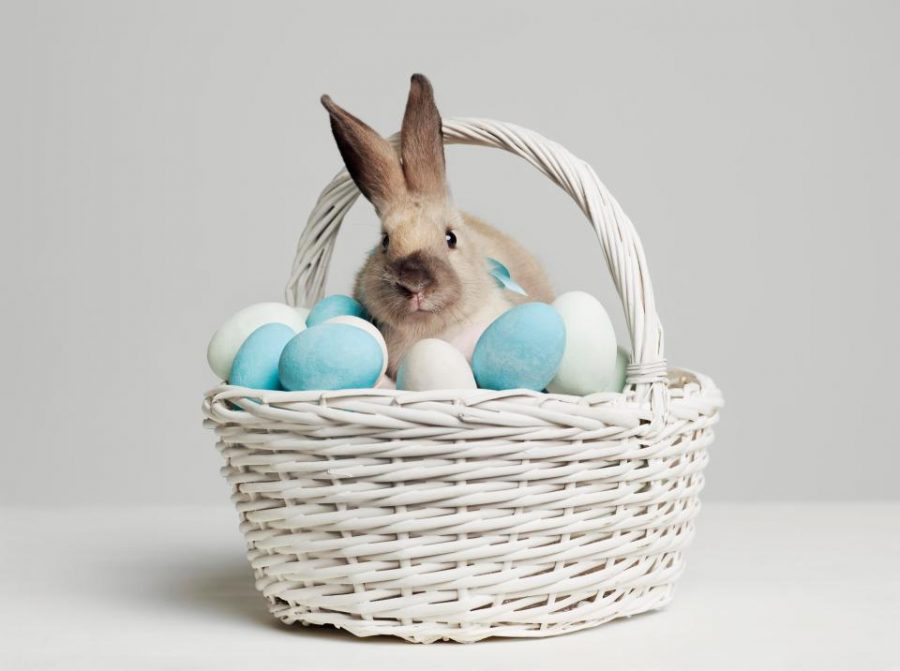A rabbit’s Easter plight
April 12, 2018
As spring arrives, so does the dreadful reign of hay fever, but as soon as the Easter season comes creeping around the corner, a very different epidemic strikes. In almost an instant, store shelves are lined with cuddly plushies of twinkly eyed rabbits and bunnies made of just about every candy on the spectrum. It’s a true, one of a kind, rabbit-made phenomenon– one that I like to refer to as “rabbit fever” (not to be mistaken with the bacterial infection of the same name).

Thanks to their undeniably adorable looks, rabbits have always been the center of love and adoration from people around the world, but this love seems to skyrocket exponentially as soon as Easter hits. Being something of a mascot for the spring holiday, this is inevitable. However, the beloved Easter Bunny has put the domesticated rabbit population in grave danger. Every Easter, adoption rates for pet rabbits reach the highest they do out of any other day of the year and, though this initially sounds great for the many lovely rabbits waiting for their fur-ever homes, looking at the days and months that follow show that a majority of these same rabbits wind up neglected or surrendered to rescue centers. According to the United Kingdom’s Metro News, every Easter, pet stores are urged to suspend their rabbit sales due to the fact that as many as 80 percent of domesticated rabbit deaths have been the result of that very neglect.
So, what exactly is the culprit? I feel as though several fingers could be pointed in this situation– maybe at the “rabbit fever” that I mentioned earlier, maybe even at pet stores that actively increase advertisement for their pet rabbits around the holiday. Many things can be said to play a part, but none have nearly as big of an impact as the level of sheer carelessness and irresponsibility many of those buying these rabbits have shown. Very few bother doing the proper research before diving right on in and buying a rabbit and, as a result, very few wind up happy with what they have purchased, insisting that having a rabbit was nothing like what they had expected it to be. But, how can they possibly have the right to say that they expected anything when they knew nothing to begin with?

Out of the many animals we have domesticated, rabbits are the most frequent victims of being misconstrued. In fact, as a rabbit owner myself, I’d go as far as to say that the general public’s perception of the beloved pet rabbit is a complete 180 of what they are in actuality and, while rabbits are as cuddly, playful, and friendly as a dog or a cat, their needs and requirements couldn’t be more different. Below, I’ll be debunking these very myths and misconceptions surrounding Easter’s favorite animal.
- Rabbits are cheap, low maintenance pets: Being very unlike dogs and cats, many are quick to assume that rabbits are cheap and easy to care for. However, what they fail to realize is that rabbits aren’t goldfish, either. Although they don’t need daily walks, they have a string of other needs, including weekly litter box cleaning, fresh hay, food, and water on a daily basis, and regular veterinary check-ups, to make up for that. Rabbit shelters say that one should expect to pay around $1,000 every year for a pet rabbit and around $10,000-$12,000 during the duration of their lifetime.
- Rabbits have a short lifespan of around two years and don’t require long term commitment: While this may apply to rabbits living in the wild, house rabbits are a completely different story. A healthy domesticated rabbit can live up ten to twelve years, making their lifespan equivalent to that of some dog breeds. Saying that pet rabbits aren’t a long term commitment couldn’t be further from the truth.
- Rabbits don’t require the same level of veterinary care as dogs and cats: Though it is true that they require annual vaccinations, regular veterinary check-ups to help detect health issues, such as teeth overgrowth or misalignment and the deadly bacterial infection “snuffles,” while they’re still in their early and curable stages. Spaying and neutering is also necessary to prevent aggressive, hormone-driven behaviors and help them live longer, healthier lives.
- Rabbits love to be picked up and cuddled with: Although this certainly does vary from rabbit to rabbit, more often than not, rabbits don’t tolerate being held and carried very well due to their natural instincts as prey animals. When mishandled, rabbits will do anything to defend themselves and this includes biting, scratching, and kicking. Rabbits that aren’t spayed or neutered will also turn to nipping and “boxing” (when a rabbit stands on its hind legs to dig at someone with their front paws) to protect their territory. When it comes to be shown affection, rabbits typically prefer being pet as opposed to cuddling since they tend to squirm and kick their way out when they feel they’re being restrained or too much weight is being put on them.
- Rabbits are great pets for children: If you couldn’t tell already, rabbits definitely aren’t the best pets for children. Unlike dogs or even cats, rabbits lack that same patience and resilience needed to put up with the way most children would handle them. Just as they are in the wild, rabbits are easy to startle and, as explained earlier, aren’t afraid to defend themselves when they feel like they’re in any sort of danger, even if this means harming a child in the process.

Don’t let what I’ve explained scare you away, though! Being categorized as an “exotic” pet, there’s no denying that rabbits are definitely more complex in terms of their needs and level of care. None of this changes the fact that these fluffy, bright-eyed, long-eared animals make lovely pets and companions and raising a happy and healthy pet rabbit can prove to be an incredibly rewarding experience if the proper amount of work is willing to be put in. However, before deciding to take one of these adorable animals home, do your research! Like most other pets, deciding to own a rabbit is an incredibly big decision and definitely isn’t one that should be made in an hour’s time at a pet store just because it happens to be Easter Bunny season.

Being the big mascots and icons for the cherished spring holiday, I think it’s only fair that we let rabbits enjoy Easter just as much as we get to and, in order to let that happen, the time to put an end to irresponsible rabbit sales has to be now. Instead of hunting for that perfect little bunny rabbit as the perfect Easter gift for your loved ones, consider hunting for eggs instead! After all, a plastic egg can’t chew up your phone cords and definitely won’t eat up all the money in your wallet for new chew toys either. If you know that owning a rabbit isn’t the lifestyle for you, then consider opting out for a chocolate rabbit! They’re equally as adorable and just as sweet as their living counterparts, just without all the extra strings attached. Unlike pastel-colored eggs and the Easter Bunny, pet rabbits certainly aren’t on the list of things you need to have for a great Easter, so why even bother?







